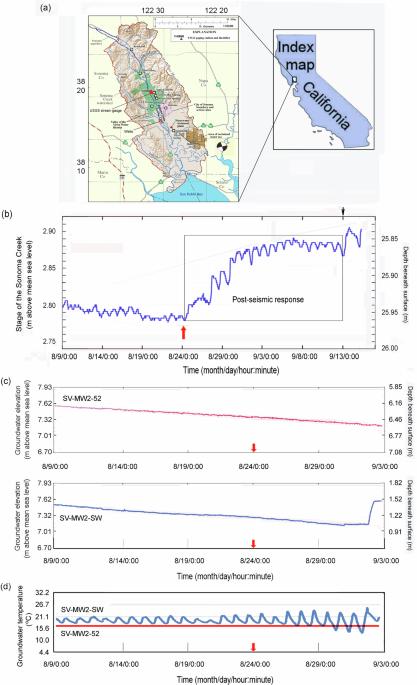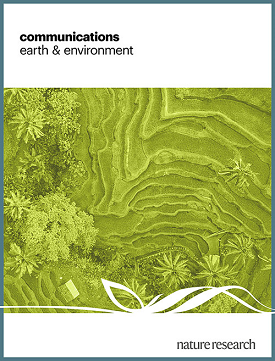地下水与地表的相互作用放大了震后的溪流波动
IF 8.1
1区 地球科学
Q1 ENVIRONMENTAL SCIENCES
引用次数: 0
摘要
2014 年南纳帕地震发生后,加利福尼亚州中部的长期干旱接近尾声,索诺玛溪的溪流增加,并出现了日波动幅度加大的现象。然而,浅层地下水却没有发生此类变化。在此,我们根据溪流数据和河岸沉积物的水力特性进行的数值模拟结果表明,波动的扩大反映了地震后地下水位上升与河岸地带植物根系之间的相互作用增强。白天的蒸发蒸腾作用使河岸带下方的地下水位保持在较低水平,从而降低了溪流的排水量。夜间,地下水位上升,增加了溪流的排放量。该研究还表明,地震诱发的地下水与地表之间的相互作用存在巨大的空间差异,这可能会影响我们对地震对植被和生态系统影响的空间尺度的理解。根据溪流记录和河岸沉积物水力特性约束下的数值模拟结果,由于地下水位上升与河岸地带植物根系之间的相互作用被放大,2014 年加利福尼亚州南纳帕地震导致索诺玛溪的溪流增加和昼夜波动。本文章由计算机程序翻译,如有差异,请以英文原文为准。

Groundwater-surface interaction amplified post-seismic streamflow fluctuation
Following the 2014 South Napa earthquake near the end of a long drought in Central California, streamflow in Sonoma Creek increased and showed amplified daily fluctuation. However, no such changes occurred in the shallow groundwater. Here we show that the amplified fluctuation reflected increased interaction between the post-seismic rising water table and plant roots in the riparian zone, according to results from numerical simulation constrained by streamflow data and hydraulic properties of riparian sediments. Evapotranspiration during the day kept the water table low beneath the riparian zone, lowering the discharge to the stream. At night, the water table rose and increased discharge to the stream. The study also show substantial spatial difference in earthquake-induced interactions between groundwater and the surface, which may influence our understanding of the spatial scale of earthquake impacts on vegetation and ecosystems. The 2014 South Napa earthquake in California caused increased streamflow and diurnal fluctuations in Sonoma Creek due to amplified interaction between rising water table and plant roots in the riparian zone, according to results from numerical simulations constrained by streamflow record and hydraulic properties of the riparian sediments.
求助全文
通过发布文献求助,成功后即可免费获取论文全文。
去求助
来源期刊

Communications Earth & Environment
Earth and Planetary Sciences-General Earth and Planetary Sciences
CiteScore
8.60
自引率
2.50%
发文量
269
审稿时长
26 weeks
期刊介绍:
Communications Earth & Environment is an open access journal from Nature Portfolio publishing high-quality research, reviews and commentary in all areas of the Earth, environmental and planetary sciences. Research papers published by the journal represent significant advances that bring new insight to a specialized area in Earth science, planetary science or environmental science.
Communications Earth & Environment has a 2-year impact factor of 7.9 (2022 Journal Citation Reports®). Articles published in the journal in 2022 were downloaded 1,412,858 times. Median time from submission to the first editorial decision is 8 days.
 求助内容:
求助内容: 应助结果提醒方式:
应助结果提醒方式:


